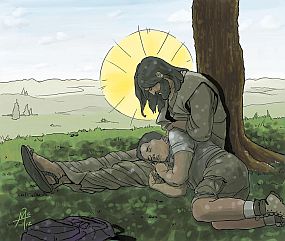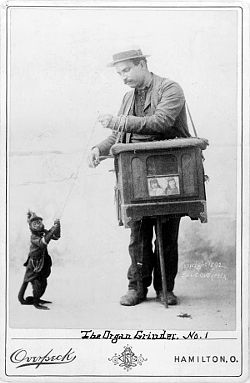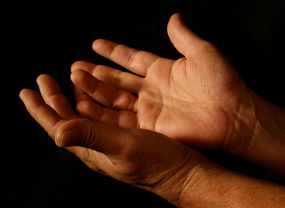In trying to usurp the role of God, Man walked away from God and created a rift. To counter, God showed Man what it would take to cross that rift and return home to Him. That answer was called the Law. All Man needed to make the Law succeed was to do all of it perfectly.
Problem with the Law: No one got it right. Ever. In the end, what the Law accomplished more than anything else was to show the impossibility of doing it. The Law was a bridge too far, and no one could cross. God showed Man what was needed to make it across, but Man failed utterly.
 Except one man, Jesus. He kept all the Law perfectly. He achieved the holiness that comes from doing all the Law correctly. And when He had crossed that metaphorical bridge over the rift and reached the other side, Jesus announced, “It is finished.”
Except one man, Jesus. He kept all the Law perfectly. He achieved the holiness that comes from doing all the Law correctly. And when He had crossed that metaphorical bridge over the rift and reached the other side, Jesus announced, “It is finished.”
Except a lot of people don’t believe it is finished. Even Christians. Therein lies the problem.
Every Sunday in churches across the world, people sit in chairs, pews, and even on the bare ground and wonder what they need to do to cross the bridge. Because the rift is still there, and if they don’t cross the bridge, they remain separated from God. The rift they know. It’s that the bridge has been crossed for them that they fail to grok.
This sitting in church Sunday after Sunday and sometimes days in-between and wondering how one is going to cross that rift is one of the greatest plagues on the modern Church. It’s a sign that even though the Church has the Good News of Jesus, it’s not sinking into people.
The major difference between Christianity and nearly all other religions is that those other religions demand people cross the bridge using their own power, their own religiosity, their own supposed holiness. What methods people use varies from religion to religion, but one thing stays the same: people utterly fail to cross the bridge on their own.
In the Christian faith we have the Good News, or what we call the Gospel. That Good News first heard by the people of Palestine 2,000-plus years ago proclaims that Jesus has come on our behalf, and He will cross the bridge for us. He will keep perfectly all the Law, and not only this, but He will be the sacrifice of blood demanded as recompense for Man creating the rift in the first place.
Jesus came, lived, ministered, and accomplished.
Jesus did it all. It is finished. No more recompense necessary. No more need to cross the bridge on our own. Jesus did it all for us.
The question is of holiness, that which is required to approach a holy, perfect God who has set a bridge across the rift. The answer is in Jesus. His holiness in keeping all the Law and satisfying the debt becomes your holiness and mine. For those who come to Jesus as their hope for crossing, Jesus imputes His holiness. By being in Jesus, we have crossed the bridge and been counted holy and debt-free because God sees what Jesus did for us, not what we try to do for ourselves.
In the mockumentary This Is Spinal Tap, the stoner rock band releases its newest album the band members believe will be bigger than The Beatles’ White Album. Spinal Tap’s album is entirely black. No band name. No title. No cover information. Nothing but blackness. Trying to wrap their heads around the concept, they ask, “How much more black could this be?” To which comes the answer, “None. None more black.”
How much more holy can a believer in Jesus be? None. None more holy. Jesus did it all on His own for us. Nothing we can do on our own can make us more holy, more acceptable to God. It is finished. We can’t add to what Jesus did, either. Jesus took care of it all. Our ridiculous contributions add nothing. The Bible calls our feeble attempts “dirty rags.”
The fancy word for trying to cross the bridge on our own religious merits is Pelagianism. It should be better known as AbjectFailure-ism. Weirdly, while some people reject Pelagianism, they’re OK with a modified form of it. Saying that Jesus got us mostly there but adding our own merits boosts us all the way across is the mockery of Jesus’ “It is finished” known as Semi-Pelagianism.
Those who love what Martin Luther started in the Protestant Reformation get a hoot out of mocking–for good reason–the stupidity that is Pelagianism and Semi-Pelagianism.
Except…
You see, we have this problem of should-ing in the Protestant Church. Christians who say they believe Jesus when He says He finished it all don’t actually believe. Instead, Church leaders and other well-meaning busybodies tell us we should tithe, should volunteer, should read our Bible ___ number of times a day, and should pray ___ times a day too. We should have a monthly date night with our spouse, should avoid the wrong kinds of movies, should do this thing or that action. Should, should, should. The result? Too few Christians believe that Jesus said He finished the job and paid the price so that we can lay down all these shoulds and live truly free. Instead, we get a message that shoulds all over everyone.
That’s not Good News. It’s removing the chains of the Old Testament Law that Jesus said He fulfilled and freed us from and putting on chains we make out of a mistaken reading of the New Testament. We exchange one imprisonment for another. We’ve just added a coating of Jesus to the chains.
That’s the crazy thing about the Gospel. You and I don’t have more lawful requirements to fulfill. This is what makes the Good News a scandal. The idea that we can’t add anything to what Jesus finished galls people. It angers because we want to be proud of our own religiosity.
The group Jesus opposed more than any other were the Pharisees. They insisted they had crossed the bridge on their merit. When Jesus pointed out that they’d failed miserably, they sought to kill Him. That’s how much they worshiped their own religious pride.
Each of us has his or her own Pharisee inside that insists we can keep the Law and not fail. There’s an American version of that Pharisee too, one that tells us we have other laws to keep such as being beautiful, successful, empowered, in control, and masters of our own American Dream.
Whether an American Phariseeism or the old-fashioned original kind, that Pharisee in us is both deceived and a damned liar.
Jesus condemns this self-righteous, “don’t need your help Jesus because we’ve got this bridge crossing thing covered on our own” Phariseeism every time He can.
In Jesus’ parable of the prodigal son, the younger son tells his father that he wishes dear ol’ dad were dead and demands his inheritance, which he then blows on hookers, booze, and partying. Eventually reduced to coveting slop intended for pigs, he crawls back home demoralized.
At first sight of the prodigal, his father runs to him and tearfully welcomes him with open arms because he loves that messed up ingrate kid so much.
Meanwhile, the elder son stands by dad, pissed, because he never whored around, didn’t squander his inheritance, and was here at home all along, dutifully keeping his own nose clean.
Which of the two sons gets the stern lecture from the father? You’d think the younger, but you’d be very, very wrong.
Jesus also tells the story of a farmer who hires some men at the first of the day to come work in the field after those early risers agree to the wage. But the work is too big, so later in the day he hires more. Then even more. Near the close of the day, the farmer is still hiring.
Finally, the day ends. The farmer pays everyone he hired the same money, but the men who worked from the early morning, who agreed to work for that amount, are hacked off. They insist they acted like the best kind of workers and not like those who frittered away most of the day and only came out to work near sundown. How can the farmer give everyone, fritterers included, the same pay?
In both parables, Jesus points out self-righteousness: We’re scandalized by God’s ignoring of what humans do to try to cross the bridge, incredulous that He looks only at what Jesus has done.
Like the father of the prodigal, God stands at the end of the bridge over the rift with His arms open. In fact, when we hear the fancy spiritual word repentance, all it means is that God has His arms open and simply wants us to cross the bridge and come home to Him. And because the bridge was already crossed by Jesus and the bridge itself paid for, being in Jesus means we’re already considered to have crossed and paid. There’s nothing more to do but rest in the arms of Father God.
No more tragic figure exists than the person who believes Jesus is God but who spends all of life trying to be a “good Christian.” To him or her, I say this: Stop trying! It is finished. Jesus did it all. Rest in Jesus’ success. If you try to perform on His behalf, you’re usurping the role of God again, which was the very error that started this mess!
Some folks will object to this post on the grounds that we need to be slaving away to perfect ourselves to look more like Jesus. But the promise from God is that because of Jesus’ finished work, that’s not our job but God’s alone. He is both the author and finisher of our faith. It’s all on Him to make us look more like Jesus and none of it on us. Can the pot mold itself? No, only the Potter can mold it as He sees fit.
It is finished. All we have to do is acknowledge our failure to get across the bridge on our own and our desperate need for Jesus. Then we can head home and fall into the embrace of our Heavenly Father.
And that’s the Gospel’s Good News.
 I’ve never seen an actual organ grinder and his monkey. Italian men with handlebar mustaches come to mind, wearing Tyrolean costumes, while a capuchin or spider monkey gambols about his feet in a cute, little red vest and fez.
I’ve never seen an actual organ grinder and his monkey. Italian men with handlebar mustaches come to mind, wearing Tyrolean costumes, while a capuchin or spider monkey gambols about his feet in a cute, little red vest and fez.
 Except one man, Jesus. He kept all the Law perfectly. He achieved the holiness that comes from doing all the Law correctly. And when He had crossed that metaphorical bridge over the rift and reached the other side, Jesus announced, “It is finished.”
Except one man, Jesus. He kept all the Law perfectly. He achieved the holiness that comes from doing all the Law correctly. And when He had crossed that metaphorical bridge over the rift and reached the other side, Jesus announced, “It is finished.” One day, I cupped my hands in prayer and said, “God, fill these hands.”
One day, I cupped my hands in prayer and said, “God, fill these hands.”